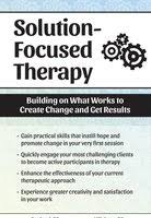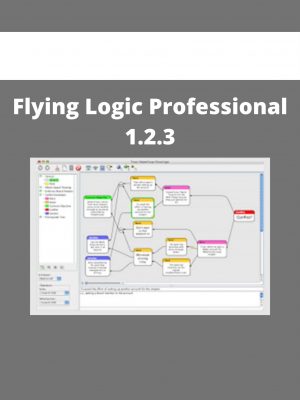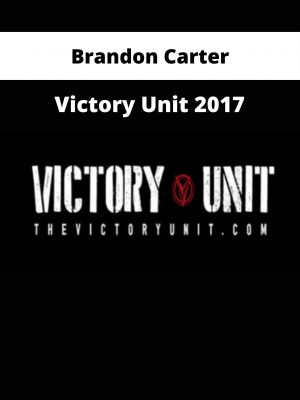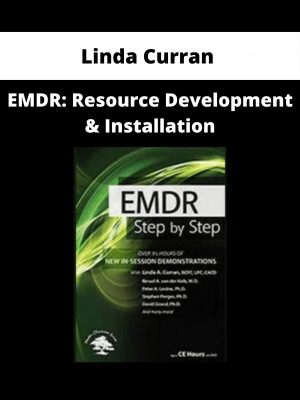Seth Bernstein – Solution Focused Therapy, Building on What Works to Create Change and Get Results
$200 Original price was: $200.$75Current price is: $75.
Shopping Instructions:
- DISCOUNT 15% : SHOP15
- Product Delivery: Within 1 – 12 hours after purchase.
Packed with case examples, video and film demonstrations, discussion and practice, this workshop is engaging, informative and immediately useful to clinicians at any training level.
Seth Bernstein – Solution Focused Therapy, Building on What Works to Create Change and Get Results
Pain brings a client to therapy. Hope keeps them coming back.
But that hope can be lost when sessions are focused primarily on problems and pathology, leaving clients (and therapists) overwhelmed and discouraged. Solution-Focused Therapy changes that dynamic by giving you the tools you need to show your clients that solutions are possible … and they don’t need to wait very long to see meaningful results!
Designed to complement any theoretical framework, Solution-Focused Therapy engages and activates clients to make change, whether they are new to therapy or have found themselves “stuck” in the therapeutic process. Unlike traditional problem-driven approaches, Solution-Focused Therapy helps clients recognize their internal resources, identify personal strengths and build on what is already working for them.
Packed with case examples, video and film demonstrations, discussion and practice, this workshop is engaging, informative and immediately useful to clinicians at any training level.
In this recording, you’ll learn practical, innovative ways to:
- Quickly engage and activate clients in their treatment
- Retain clients who might otherwise drop out of therapy
- Improve clinical outcomes for even the most “stuck” clients
- Use between-session assignments to enhance the work you’re already doing
- Empower clients to continue to make progress once therapy ends
- Ascertain how a “successful outcome” in therapy is defined when utilizing a solution-focused approach.
- Utilize specific solution-focused techniques to improve client engagement in therapy and improve clinical outcomes.
- Explain the importance of focusing on clients’ values in order to increase motivation and elicit therapeutic change.
- Develop a solution-focused treatment plan that incorporates attainable, client-driven goals.
- Implement clinical interventions that improve clients’ sense of agency and control over their treatment.
- Utilize scaling and the concept of “positive differences” to assist clients in recognizing their competencies and therapeutic progress.
Would you like to receive Seth Bernstein – Solution Focused Therapy, Building on What Works to Create Change and Get Results ?
Do More of What’s Working: Integrate Solution-Focused Therapy Into Your Current Approach
- Redefine “successful outcome” in therapy
- Find the exception to the problem
- Who is the expert?
- Stay in the present
- Change language and interventions to be strengths-based
- A new perspective on goal setting
- Limitations of the research and potential risks
Quickly Engage Clients in Treatment: Get Buy-In and Instill Hope During the First Session
- Build the therapeutic alliance
- Decrease resistance and defensiveness
- Integrate Prochaska’s Stages of Change
- Emphasize client competence with the “Yes Set”
- Help clients recognize existing support
- Exercises to identify personal VIPs
- Relationship “deposits”
- Utilize evidence-based compliments to reinforce strengths and coping skills
Behavior Management Plan Development
- A Comprehensive Step-By-Step Guide with Worksheets and Checklists
- Explicitly describe the behavior
- Assess impact of cognition, emotion, medical status, personal history on behavior
- Identify the cause of the behavior
- Interventions to address causes of behaviors
- Environmental changes
- Communication changes
- Schedule changes
- Medical changes
- Staff changes
- Write a thorough behavior intervention plan for the entire care team
- Evaluate the success of the behavior management plan or reasons for failure
Gain Therapeutic Momentum: Activate Change Through Collaboration
- Gain a motivational edge by tapping into client values
- Interventions that emphasize client strengths and competencies
- Identify clients’ preferred future with variants of the “Miracle Question”
- Nurture clients’ sense of agency by highlighting:
- Successes
- Coping skills
- Positive differences
- Progress in treatment
- Elicit change with solution-focused goal setting
Putting It All Together: Combine Strengths and Skills to Create Lasting Change
- Strategies that facilitate therapeutic change
- Incremental learning
- Between session assignments
- Continue building on the positive
- Resource activation
- Expanding personal VIPs
- Utilize “scaling” as an outcome monitoring and motivational tool
- Work through transference issues that may impede progress
- Termination considerations
Related products
NLP & Hypnosis
NLP & Hypnosis
iAwake Technologies – Beginner’s Mind (Neuroflow Series) [6 WebRips – WAV User Manual – PDF]
NLP & Hypnosis
NLP & Hypnosis
NLP & Hypnosis
NLP & Hypnosis
NLP & Hypnosis






![Iawake Technologies – Beginner’s Mind (neuroflow Series) [6 Webrips – Wav User Manual – Pdf]](https://copicourse.com/wp-content/uploads/2021/08/iawake-technologies-beginners-mind-neuroflow-series-6-webrips-wav-user-manual-pdf-300x400.jpg)




